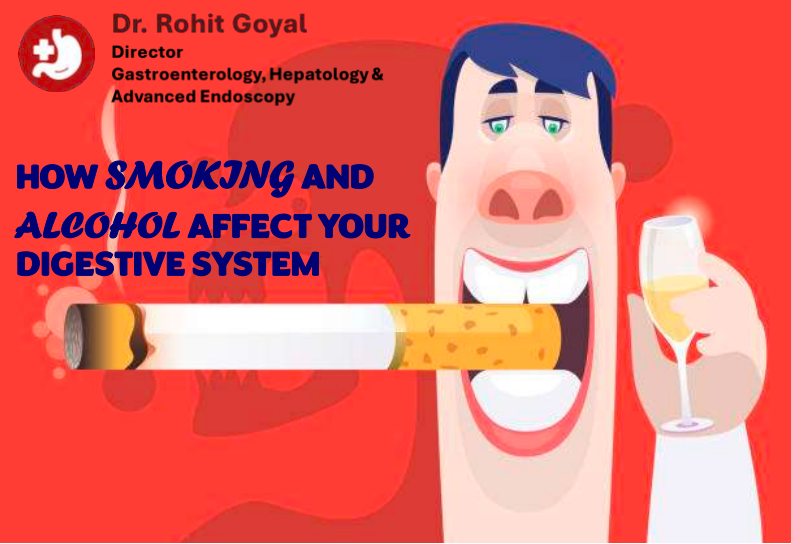Smoking and alcohol negatively impact on the digestive system by increasing acid production, weakening the esophagus, and damaging the stomach lining, leading to issues like acid reflux, ulcers, and gastritis.
Smoking also disrupts gut bacteria and raises the risk of stomach and colon cancer, while alcohol contributes to liver disease, malabsorption of nutrients, and pancreatitis. Both habits can cause digestive discomfort, irregular bowel movements, and long-term gastrointestinal disorders. Reducing or quitting smoking and alcohol can significantly improve digestive health and overall well-being.
Effects of Smoking on the Digestive System:
- Increase Acid Production- Smoking stimulates stomach acid production, increasing the risk of acid reflux and heartburn.
- Weakens the lower Esophageal Sphincter (LES)- This allows stomach acid to flow back into the esophagus, leading to GERD (gastroesophageal reflux disease).
- Delays Stomach Emptying- Smoking damages the stomach lining and reduces blood flow, making it harder for ulcers to heal.
- Raises Risk of Peptic Ulcers- Smoking damages the stomach lining and reduces blood flow, making it harder for ulcers to heal.
- Increases Risk of Stomach and Colon Cancer- Tobacco contains carcinogens that can lead to cancers of the digestive tract.
- Worsens Liver Health- Smoking increase risk of liver cancer in patients with liver disease.
Effects of Alcohol on the Digestive System
- Irritates the Esophagus and Stomach Lining- Alcohol increase stomach acid production, leading to gastritis, acid reflux, and ulcers.
- Contributes to Esophageal and Stomach Cancer- Chronic alcohol use is a major risk factor for esophageal cancer.
- Causes Liver Damage- Long-term alcohol use leads to fatty liver, hepatitis, cirrhosis, and liver failure.
- Disrupts Gut Microbiome- Alcohol changes our gut bacteria, leading to dysbiosis, bloating, and irritable bowel symptoms.
- Cause Malabsorption- Alcohol interferes with absorption of nutrients like vitamins B12, A, D, E and K, leading to deficiencies.
- Increases Risk of Pancreatitis- Excessive alcohol can cause acute or chronic pancreatitis, which can lead to life threatening complications.
- Speeds Up or Slows Down Bowel Movements- Alcohol can cause diarrhea or constipation, depending on how it affects gut motility.
PREVENTION
Preventing the harmful effects of smoking and alcohol on the digestive system requires a proactive approach to maintaining a healthy lifestyle. By making conscious choices such as quitting smoking, moderating alcohol intake, and adopting a balanced diet, you can protect your digestive organs from long-term damage, consider the following preventive measures:
- Quit Smoking- Seek medical support, nicotine replacement therapy, or counseling to stop smoking.
- Limit Alcohol Intake- Follow recommended guidelines and avoid excessive drinking to prevent liver and gut damage.
- Eat a Healthy Diet- Consume fiber-rich foods, probiotics, and plenty of water to support digestion and gut health.
- Exercise Regularly- Physical activity helps maintain a healthy metabolism and improves digestive function.
- Manage Stress- Practice relaxation techniques like yoga and medication to reduce stress-related digestive issues.
- Stay Hydrated- Drinking enough water helps flush toxins and keeps the digestive system functioning properly.
- Regular Health Checkups- Routine screenings for liver function, gut health, and early signs of digestive disease can help in prevention and early treatment.
Making these lifestyle changes can significantly improve your digestive health and overall well-being.
HOW CAN A GASTROENTEROLOGIST HELP?
A gastroenterologist can help by diagnosing, treating, and managing digestive issues caused by smoking and alcohol consumption. You can see a gastroenterologist near you to assess symptoms like acid reflux, gastritis, ulcers, liver disease, and pancreatitis through tests such as endoscopy, liver function tests, and imaging studies. They will provide personalized treatment plans, including medications to heal the stomach lining, manage acid production, and support liver health. Regular checkups you’re your
gastroenterologist can help detect and address digestive problems early, ensuring better long-term health.
WHEN SHOULD YOU SEE A GASTROENTEROLOGIST?
You should see a gastroenterologist if you experience persistent digestive issues or symptoms that affect your daily life. Common signs that require medical attention include:
- Frequent acid reflux or heartburn that doesn’t improve with lifestyle changes.
- Chronic abdominal pain, bloating, or discomfort after eating.
- Difficulty swallowing (dysphagia) or a feeling or food getting stuck.
- Unexplained weight loss or loss of appetite.
- Persistent nausea or vomiting, especially with blood.
- Changes in bowel habits, such as chronic diarrhea, constipation, or blood in stool.
- Jaundice (yellowing of skin and eyes), which may indicate liver problems.
- Signs of liver disease, like dark urine, swelling in the abdomen, or fatigue.
- Family history of digestive disorders, such as colon cancer or inflammatory bowel disease (IBD).
If you have these symptoms, a gastroenterologist can diagnose the underlying cause and provide the right treatment. Regular screenings are also recommended if you are at risk for colon cancer or liver disease.
FINAL THOUGHTS
Smoking and alcohol can severely impact your digestive health, leading to issues like acid reflux, ulcers, liver disease, and even digestive cancers. To prevent these complications, it’s essential to quit smoking, limit alcohol intake, maintain a healthy diet, and stay active. If you’re experiencing persistent digestive symptoms, visiting a specialist is crucial. Dr. Rohit Goyal, senior gastroenterologist in Dwarka & west Delhi, provides expert diagnosis and other gastrointestinal conditions. As a trusted gastroenterologist in Dwarka, he offers personalized care to help you manage and prevent digestive diseases. Prioritizing your gut health with expert guidance can improve your overall well-being and equality of life.













